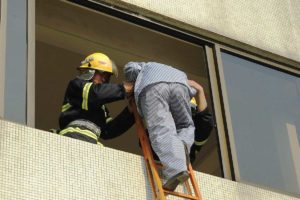This article about the need for reforms in NSW fire protection industry has been provided by Nathan Whaley, National Fire Electrical.
I was recently in a discussion with Nikki Jovicic about the fire protection industry’s current state. Nikki had been speaking with an industry contact who was expressing concerns to her and she asked if I also felt the industry was broken.
GET NOTIFIED WHEN WE PUBLISH NEW Q&AS, NEWS AND ARTICLES TO THE SITE
Overall, my answer is yes. NSW is in need of reform on many levels throughout the fire protection industry. Some of the areas I feel need attention:
Government Regulation
NSW is currently lacking a clear direction with compliance/regulation of all fire safety practitioners.
In Queensland, they have the QBCC’s Fire Protection Occupational licence through Queensland Building and Construction Commission.
In Victoria they have the Victorian Building Authority (VBA) driving much-needed reform
In NSW, the state regulators have not made a definitive decision and we have the self-appointed Fire Protection Association of Australia (FPAA) who are seeking to instate their organisation as the industry driver. Nothing has been finalised at this stage.
So, with no government regulators leading the process of reform in NSW, we are left waiting.
I strongly feel independent groups do not have the resources or funding capabilities to facilitate adherence to compliance.
Independent Auditors and Investigators – Fire Technician Compliance
The FPAA as they are currently positioned would like to be the registered training organisation who educates the states technicians and also the body that audits the works completed by all of the industry. I see this as a conflict of interest.
The FPAA need to decide if they want to be the association that supports the industry and provides training and education or be the enforcer of compliance/audit process of all technicians and companies industry wide. You can’t do both transparently.
As I see it if the FPAA generates revenue as a registered training organisation (RTO), and if a medium-sized fire company cuts corners which requires severe action to be enforced, how does the FPAA remain impartial when they rely heavily on the revenue that they receive from training said company’s staff. The income equates to approximately $5,000 per technician.
If they enforce restrictions and remove licensing for the non-compliant company, they are losing revenue.
From the conferences I have attended and the interactions I have had with FPAA staff, they are severely under-resourced and in need of the training revenue. As it currently stands, they are yet to be officially appointed at a legislative level.
The other conflict is that the directors and senior management of the FPAA are also directors of medium to large companies in the fire industry and this also creates a situation where they cannot be fully impartial when their vested interest is in the success of their own enterprise.
Annual Fire Safety Statements (section 7)
We have been instructed by the FPAA that only the managing agent can sign section 7 on the Annual Fire Safety Statement (AFSS). Since the fire maintenance company does not control the cash management of the strata plan or is the appointed agent of the strata plan, only the managing agent of the strata plan has the authority to sign this section.
Contrary to this the Strata Community Association (SCA) have instructed their members not to sign section 7, which creates confusion between the Strata Managers and fire maintenance contractors leaving section 7 of the AFSS as a continued point of contention.
In some cases, fire companies are still signing this important section without understanding the ramifications.
Urgent clarity on this matter is required from the NSW Government to ensure the appropriate authorised representative is signing this section.
Market Driven by Price, Not Compliance or Quality
There are fire maintenance companies cannibalising the market with no intention of completing the work they have been engaged to complete and as a result, prosper and create an undervalued perception in the market.
Feedback we have received on our quotations for annual fire safety maintenance indicates that other providers are offering hugely discounted rates. They are quoting to complete a year’s worth of maintenance for hundreds and sometimes thousands of dollars less than the genuine market rate for a complete inspection which would meet Australian Standards.
Either staff are being underpaid, the company does not complete the tasks compliantly, or they rush through tasks and don’t complete a thorough inspection process. They may be providing little to no documentation and the building is not tested and maintained to the Australian Standard and BCA.
Council Resources
Councils are increasingly faced with a high volume of work that is difficult to manage and often from my discussions, under-resourced from a skill perspective for fire compliance of fire protection maintenance. This leaves a gap and risk to all facets of the industry.
I think our industry is such a critical element of public safety and it really needs more attention to create a consistent message and keep people safe at large scale.
Whether you agree or disagree with Nathan’s thoughts about the need for changes to NSW’s Fire Protection industry, we’d like to hear your thoughts. If you have something to add to the article, please leave a comment below.
This post appears in Strata News #308.
Nathan Whaley
National Fire Electrical
M: 02 9712 8244
E: [email protected]
This article does not constitute legal or other advice and should not be relied upon this way. Readers should take legal or other advice before applying the information containing in this publication.
Read Next:
- NSW: Changes in Legislation to Annual Fire Safety Statements
- NSW: Q&A Can I be fined for not providing access for our fire safety inspections?
Visit our Maintenance and Common Property OR NSW Strata Legislation
After a free PDF of this article? Log into your existing LookUpStrata Account to download the printable file. Not a member? Simple – join for free on our Registration page.



 NSW is currently lacking a clear direction with compliance/regulation of all fire safety practitioners.
NSW is currently lacking a clear direction with compliance/regulation of all fire safety practitioners. 
One of the best articles I have seen written on this topic Nathan. We have a fire protection & essential safety services company in Melbourne and my partner has been in the industry for years. Everything you have covered in your article are the same issues he is frustrated about as well. He is often called upon to fix the issues of fire maintenance companies, as you state, cannibalising the market with no intention of completing the work they have been engaged to complete. It’s a false sense of economy for building managers as they do chase the cheapest quote and the issues that then arise from a job poorly done isn’t their problem as the issue becomes someone else’s and therefore comes out of someone else’s budget. It’s a vicious circle all round. As you state all these issues can’t be addressed until the conflict of interest is removed. $$$ will always drive behaviour. This issue isn’t isolated to NSW,
This article requires some major updates as the NSW Government HAS taken steps to reform the industry.
The NSW Government HAS appointed FPA Australia to manage the accreditation scheme and they HAVE updated the AFSS template and guidelines on who shall sign or endorse which section of the AFSS including who signs section 7.
The NSW Building Commissioner has taken it one step further and stated that they will further regulate and audit this area in coming years to ensure the quality of the post-construction built-environment. e.g. licensing of inspection and testing technicians.
The first step in these changes come into legal effect on 6th April 2020 and it would be in the best interests of persons in strata to ensure their fire protection contractors are accredited ready for this change.
The changes may unfortunately result in greater costs to the strata consumer; however, it will be balanced by increased professionalism and significantly reduced risk to consumers and strata managers.
Anyone interested in more information can find more information at: http://www.fpaa.com.au/fpas/fire-safety-assessor.aspx or get in contact with the undersigned.
Also, I’ll be speaking on this subject at the SCA (NSW) Masterclass on 26th February.
Rob Broadhead
2020 Fire Protection